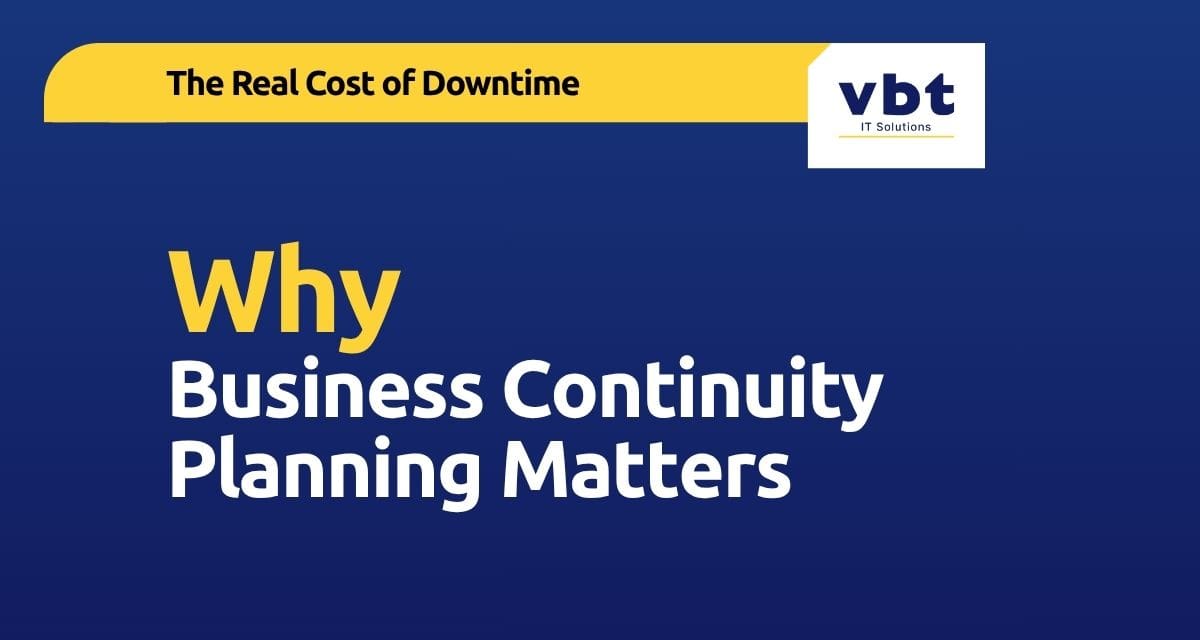The Real Cost of Downtime: Why Business Continuity Planning Matters More Than Ever

Downtime isn’t just inconvenient. For Irish businesses, especially as we approach the busy year-end period, it can cost thousands in lost revenue, damage your reputation, and frustrate clients. Every minute systems are offline is a minute you’re losing productivity, sales, and credibility. Understanding the real cost of downtime is the first step towards safeguarding your business.
Why Downtime Hits Harder Than You Think
Many organisations underestimate how expensive downtime really is. It’s not just lost transactions or missed emails. The hidden costs can include:
- Staff idle time and lost productivity
- Missed client deadlines or orders
- Reputation damage and customer churn
- Compliance penalties if data access is disrupted
In some sectors, like finance or legal, downtime can have severe regulatory implications. Retail businesses may see immediate revenue loss during peak shopping periods. Even non-profits can lose donor confidence if systems fail during donation campaigns.
Year-End Risks Are Higher
November and December are peak times for many Irish businesses. Systems are under pressure from increased transactions, seasonal staff, and end-of-year reporting. Cyberattacks tend to spike during busy periods, and hardware failures or human errors can have bigger consequences when operations are running at full capacity.
Planning for these risks now can prevent costly downtime later.
Business Continuity Planning and Disaster Recovery
Business continuity planning (BCP) is about keeping your essential operations running no matter what happens. Disaster recovery (DR) is a critical component, ensuring systems and data can be restored quickly after an incident. A robust BCP addresses:
- Critical systems and processes
- Recovery time objectives (RTO) and recovery point objectives (RPO)
- Failover solutions, backups, and cloud resilience
- Employee training and emergency procedures
A solid plan reduces stress and downtime when the unexpected occurs.
Practical Steps for Irish Businesses
- Audit your critical systems – Identify which applications, servers, and data are essential.
- Implement regular backups – Cloud-based solutions and offsite backups are vital.
- Test recovery procedures – Regular simulations ensure your plan works under real conditions.
- Ensure staff readiness – Everyone should know their role in a downtime scenario.
- Monitor and update – Systems change, threats evolve, and your BCP should reflect that.
Even small businesses can benefit. Taking these steps now protects operations, revenue, and reputation during the holiday period and beyond.
VBT’s Approach
At VBT IT Solutions, we work with Irish businesses to plan, implement, and test their business continuity strategies. Our team ensures:
- Risk assessments are tailored to your business
- Recovery solutions minimise downtime
- Staff are trained to act confidently during incidents
- Systems and procedures are regularly reviewed
We help organisations move from reactive firefighting to proactive resilience.
Practical Tip: Schedule your BCP review before November ends to avoid surprises during the busiest season.








